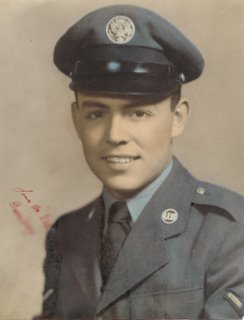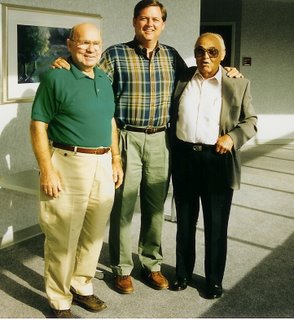
Foreword
What is a hero?
Nowadays it seems like heroes are pretty plastic. They are cartoon characters or movie stars with superhuman powers. They are actors that play a role as a hero in a movie. They are famous athletes. They are people that have amassed a lot of wealth. They are even heroes because they handsome, cute, sexy or pretty. Sometimes they are heroes because they are bizarre or shocking in their behavior or mannerisms. You hear very few people say their personal hero is “so and so” because they are honest, hardworking, nice, loyal, virtuous, religious, patriotic or service oriented. Our society or the media push heroes on our children that have little redeeming value.
When people ask me who my hero is I answer without any hesitation, “My dad!” Often they will ask why? They will then wait for me to describe some amazing feat or great worldly accomplishment. I simply tell them that he is my lifelong best friend and that through consistent hard work and tough choices he created a better life for me and my progeny. However, if they have time, I like to tell them the story that follows this foreword. It is a story of hard work, surviving, tough decisions and incredible self-learning, development of quiet pride and the use of common sense.
My dad will not feel comfortable with this writing because he will say that he has made many mistakes and would do things differently if he had life to live over. He knows he has grumpy days and lazy days and that he could have helped his neighbor more. He would say he should not be anyone’s hero. However, it is not up to my dad to choose who my hero is, that is my choice!
My hero is the very young boy who literally walked out of the wooded impoverished countryside of Mammoth Cave Park, Kentucky with very little parental supervision, no money, tattered clothing, no education and very little mentoring. Somehow he made it to the “big” city of Louisville, Kentucky. This would have been very soon after World War II when so many in America were trying to establish themselves after a long and difficult war. While in Louisville, when he was around 13 years old my dad, Harry Wells, was looking for work and food. He went in to a diner and saw two uniformed Air Force recruiters with their big blue staff car parked outside. He observed their black shiny shoes and medals pinned neatly on their uniforms as they were drinking a cup of coffee and talking confidently. Something about these men and their presence captivated him. This young boy looked longingly at the airmen and said to himself, “One day I am going to be one of them!” He had no education, not a plug nickel to his name really. All he had was a hope and a desire and some innate confidence that few people are blessed with.
A few years later, when he was 32, Harry was a Non-Commissioned Officer (NCO) in the Air Force and was assigned recruiting duty in Louisville. On reporting for duty at his new assignment, my dad asked the supervisor if he could have the keys to the staff car. My Dad took them and said, “I have something to do.” and drove the staff car to the same diner where he sat glaringly as a thirteen year old boy. He got out of the car with his own shiny patent-leather black shoes and a chest full of medals. He sat down and had a cup of coffee and probably pondered how far he had come in his still young life at that point. I am sure he felt quite a bit of personal accomplishment as he realized he had achieved one of his greatest boyhood dreams. He had become someone he was proud to be and had overcome incredible odds to be there.
So, what is a hero? As mentioned earlier, a hero can be many things to many people. As for my definition, well, I would say it is someone who, without fame or fortune overcomes difficulties without complaint, helps others along the way and creates a better life for those around him. The world is a better place for them having lived in it.
Many people say that I have accomplished a great deal in my life. My accomplishments pale in comparison to my father’s. My father gave me the platform of a common sense upbringing and shared life experiences that gave me a roadmap and foundation of confidence. He had no road map. He mustered up his own confidence when the world around him was beating him down. My father somehow, as very young boy, had the courage to walk alone out of the hills of Kentucky and start a career and a family that has blessed me, my family and my progeny for many generations to come. We will all be stronger because of the choices of this remarkable young boy. I write this story and let him share his, so that my kids and further generations of progeny will benefit knowing from whence they come and that they have the same genetic make-up to forge good lives regardless of the circumstances we are faced with.
Jeff Wells
February 12, 2006
My Dad, My Hero
As we were tramping around the leafy forest floor I couldn’t help but think that at any moment I would spot a copperhead snake or brush up against a bush and get doused with ticks or chiggers. All three were my constant companions when I used to walk through the hills and woods of Kentucky as a young boy. Today my Dad (Harry) and his older brother, Uncle Trenton, were walking the ridge of an old abandoned railway line that was constructed by the Conservation Corps in the years of and following the depression. Public works done by the Corps kept many people fed during very tough times back then.
When my dad was born in 1934 my dad’s family lived on what is now Mammoth Cave National Park. It was never their land. They were just squatters on the land and eventually the government moved them off park grounds. We were looking for remnants of the cabin where my dad was born and where his mother died. Soon, and surprisingly close to the old railroad bed, we found the stone foundation of an old chimney. The outline of the cabin footings began to take shape and through the leafy bushes bits and pieces of junk began to stand out.
Standing at what would have been the doorway I was surprised at how small the cabin must have been. Uncle Trenton pointed where the well and outhouse were. I knew instinctively they were too close to be sanitary but, what did people know about sanitation then? I thought to myself that their way of living in 1934 on this spot was no different than it had been for the human race for thousands of years. They lived off the land, stayed warm around a fire and lugged water in to the cabin in buckets and left the house to relieve themselves or filled a bucket in not very private circumstances. When I look at the conveniences I have today and realize I am just one generation apart from this lifestyle I am amazed. My how times have changed.
I could picture the cabin, unpainted, grayed wood and a rusty and loose tin roof. There was perhaps one wooden step to get in to the cabin and very little furniture. Maybe a pot-bellied stove that served as the center piece for everything. It heated the house, cooked the food, warmed the iron and burned the trash. My dad said that in the winter they used to stuff newspaper between the cracks of the wood or logs to cut the cold winds from blowing through the cabin. He said there was never any food in the house. They used to cook something up every day to get by but I don’t remember what it was that they cooked. I do remember that they were all good hunters and would go shoot squirrels, rabbits and possums with a .22 gauge rifle. I miss at 50 yards with a shotgun and can’t imagine someone hunting varmints with a single shot rifle. My dad proudly talks about having the best hunting dog in the countryside. I am sure not only was he proud but also grateful. A good hunting dog meant a greater likelihood of food on the table.
Uncle Trenton bent over and picked up an old wheel barrel tire rim. The rubber had rotted off long ago. Dad found an old thick square bottle and I picked up a rusty canteen. Dad said it was quite probable his family had used any one of these items as they were the last family to occupy the site. I brought the items home with me that day and as I later stumble across them in my chipmunk stash of things in storage many years later I remembered this walk in the woods back in 1993 which has led to me writing this story.

I am not quite sure where they moved to when they were kicked off this spot, but probably not far, just off the park. I wonder how they were told to leave and how they felt? (Oddly, sixty-six years later, by pure coincidence, I have drilled and invested in a natural gas well maybe a couple miles from this location that will produce a good income for me.)
We walked out of the woods and dad said that his only real memory of the spot was riding on or seeing the wagon that pulled his mom to the graveyard called Locust that is still on and cared for on Mammoth Cave National Park. The graveyard is not far at all from the cabin site we walked. It is a pleasant place and I enjoy thinking that my grandparents are together there and some of my relatives. In fact, my Uncle Trenton is buried there now as well.
Uncle Trenton said he could barely recognize the homestead area because of all the trees. Trees grow quickly in Kentucky and a field can become a forest in twenty years. He said the wood was cut for firewood and then the area could be farmed, but, not farmed much. They were even too poor for that.

1 Comments:
Hello from down under in NEW Zealand. I recall coming across your blog earlier - it popped up again, when I was searching the blog world. "Memories well worth sharing" with young & old, so I have mentioned your blog on my blog 21 21 21 Blogs
Post a Comment
<< Home